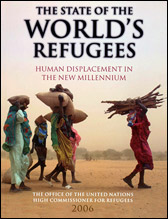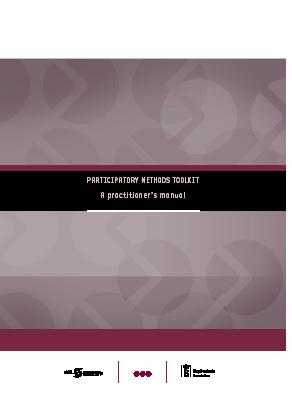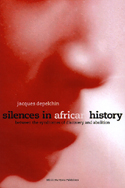
Le portail rinoceros d’informations sur les initiatives citoyennes pour la construction d’un autre monde a été intégré au nouveau site Ritimo pour une recherche simplifiée et élargie.
Ce site (http://www.rinoceros.org/) constitue une archive des articles publiés avant 2008 qui n'ont pas été transférés.
Le projet rinoceros n’a pas disparu, il continue de vivre pour valoriser les points de vue des acteurs associatifs dans le monde dans le site Ritimo.
Pages 1 | 2 | 3 | 4 | 5 | 6 | 7 | 8 | 9
The State of the World’s Refugees 2006
> United Nations High Commissioner for Refugees (UNHCR)
http://www.unhcr.org/cgi-bin/texis/v (...)
The Convention sets out the basic principles on which international refugee protection is built: non-refoulement, which emphasizes that refugees should not be returned to any place where they could face persecution; and impartiality, whereby all refugees are provided protection without discrimination. Recently, these principles have come under increasing threat. In a world which has grown increasingly hostile to asylum and refugees, the very relevance of the Convention has been questioned.Critics of the Convention allege that it is outdated, unworkable, irrelevant and inflexible. They label it a complication in the context of contemporary ’mixed migration’. For their part, many states argue that the Convention does not adequately address either their interests or the actual needs of refugees. Besides such criticisms, the refugee protection regime is being confronted by other developments with the potential to constrain refugee protection.
,
Participatory Methods Toolkit
A practitioner’s manual
> A joint publication of the King Baudouin Foundation and the Flemish Institute for Science and Technology Assessment (viWTA), September 2005, PDF, 199pp.
http://www.viwta.be/files/handboek.p (...)
’Participation’ has become a buzzword in government statements and policy papers and the concept is being given concrete shape. But how can participation be organised? What methods are available and when and how are they applied? What are the implications for the budget and staff?
To offer a few answers to these questions, the King Baudouin Foundation and viWTA decided to edit a publication with the ambition
to create a hands-on toolkit for starting up and managing participatory projects. This one is a second edition, completely revised and enlarged edition of the toolkit.
The core of the toolkit incorporates 3 additional
in-depth fiches on participatory methods giving a total of 13. This new edition adds Deliberative Polling®, 21st Century
Town Meeting® and Technology Festival to the original set, and offers an expanded introductory chapter. You will still
find brief overviews of 40 methods and techniques. A chapter with general guidelines for using participatory methods,
including a comparative chart of the discussed methods, completes the toolkit.
Giving Voice: a practical guide to the implementation of oral testimony projects
> Panos Oral Testimony Programme, September 1999
This handbook is a training manual, packed with suggestions, information, checklists and advice about how to undertake oral testimony projects. The English version of Giving Voice is available as a pdf file, and will be emailed to you for free. The French and Spanish versions of the manual are available in hard copy only (A4 ring-bound, 80 pages). To order the manual, email otp@panos.org.uk.
Silences in African History: Between the Syndromes of Discovery and Abolition
> Mkuki Na Nyota Publishers, Dar es Salaam (Tanzania), Africa Books Collective, 2005, 284 pp., £20.95 or $34.95
’Among those who have suffered enslavement, colonisation, steady and relentless economic exploitation, cultural asphyxiation, religious persecution, gender, race and class discrimination and political repression, silences should be seen as facts, because silences are indeed facts which have not been accorded the status of facts.’ So states Jacques Depelchin in this discussion, which encompasses an examination of dominant theories - political, social, economic, cultural and ideological - on Africa. The author analyses the influence of capitalism on the continent in relation to historical events over centuries. He castigates those who envision Africa solely through the eyes of colonialism. He systematically erodes misconceptions about Africa and the nature of the ’black man’, which have assumed historical status.
Sharing Knowledge for Community Development and Transformation: A Handbook
> DLR International in Canada for the Oxfam Horn of Africa Capacity Building Programme, with the support of the Canadian International Development Agency (CIDA), August 2004, 162pp., PDF
http://www.codecan.org/english/docum (...)
Sharing Knowledge 2 illustrates that information in all its forms is essential for freedom. Information is an important resource for human development. It is concerned, more specifically, with
the five freedoms identified by economist Amartya Sen in Development as
Freedom, as key for human and social development: political freedoms;
social opportunities such as education; transparency guarantees as a right
of every citizen; protective security against risks, such as ill health; and
economic facilities leading to greater autonomy. This handbook is for women
and men making use of information and knowledge for the realization of
their freedoms and those of their communities.
This revised edition now has two additional chapters on HIV/AIDS resource centres and case studies on community information resource centres in Ethiopia, as well as updates in a number of the original chapters.
© rinoceros - Ritimo in partnership with the Fph via the project dph and the Ile de France region via the project Picri. Site developed using SPIP, hosted by Globenet. Legal mentions - Contact





